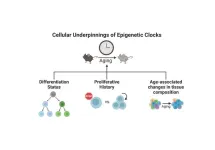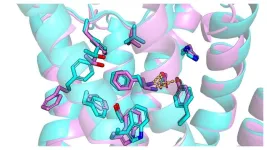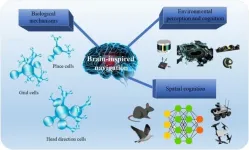(Press-News.org) Thyroid hormone plays a key role in regulating a range of physiologic functions, including metabolism, temperature, heart rate, and growth. It accomplishes this impressive array of activities by interacting with almost every organ system in the body. Yet despite a long history of research on how thyroid hormone influences different organs, its effects on arguably the most crucial organ — the brain — have remained shrouded in mystery.
Now, scientists at Harvard Medical School have gained new insights into thyroid hormone’s effects on the brain. The work, conducted in mice and published Aug. 22 in Cell, shows that thyroid hormone changes the wiring of brain circuits in a manner that drives animals to engage in exploratory behavior.
By simultaneously changing brain wiring and altering metabolic rate, the researchers concluded that thyroid hormone coordinates the brain and body to produce exploratory behavior when it is most needed — for example, during seasons when animals need to find mates or stockpile resources.
“It’s well known that thyroid hormone modulates metabolism, and now we’ve shown that it also modulates exploratory behaviors through direct action on the brain,” said lead author Daniel Hochbaum, research fellow in neurobiology in the Blavatnik Institute at HMS.
The findings also help elucidate how low levels of the hormone could lead to depressive states marked by a low desire to explore, while too much could precipitate manic states characterized by an extreme desire for exploration. Thus, the researchers see their work as an important step toward understanding how aberrant levels of thyroid hormone could contribute to certain psychiatric conditions.
Propelled by a personal purpose
Hochbaum’s interest in thyroid hormone is a personal one: His wife was diagnosed with hyperthyroidism after experiencing profound and sudden behavioral and metabolic changes. Her symptoms resolved with treatment, but Hochbaum wanted to know more about the hormone’s effects on the brain.
“I was really surprised to see that thyroid hormone had large psychiatric effects,” Hochbaum said.
He learned that too little thyroid hormone slows down metabolism and can result in symptoms of depression, while too much speeds up metabolism and can lead to symptoms of mania. Yet he couldn’t find a satisfactory scientific explanation for how this happens.
During a serendipitous conversation with Bernardo Sabatini, the Alice and Rodman W. Moorhead III Professor of Neurobiology at HMS, Hochbaum found that Sabatini shared his interest in the topic.
“Why thyroid hormone changes behavior has been something that’s puzzled me ever since medical school,” said Sabatini, who is also director of the Kempner Institute for the Study of Natural and Artificial Intelligence at Harvard University and senior author on the new study. “It was not clear why this hormone should even enter the brain at all.”
And with that, a project to explore thyroid hormone’s function in the brain was born.
Linking brain, body, and behavior
Thyroid hormone circulates in the bloodstream, traveling to almost every cell and tissue in the body. Its levels are controlled by a complex set of interactions between three players: the thyroid gland, the pituitary gland at the base of the brain, and the hypothalamus, a brain structure located just above the pituitary gland.
However, the receptor for thyroid hormone is expressed by cells throughout the entire brain, including in areas of the cortex responsible for high-level cognition like planning and decision-making.
“What is quite remarkable is that in the adult brain, the thyroid hormone receptor is not only in the hypothalamus, but it’s basically everywhere,” Hochbaum said.
To investigate why, Hochbaum, Sabatini, and their team performed genetic sequencing on individual cortical cells in mice. They found that the hormone acts on neuronal circuits in the cortex by turning on various genes, essentially changing the wiring of brain cells.
Moreover, when researchers induced higher levels of thyroid hormone in the cortex, mice became more willing to explore the environment and take risks.
Conversely, when researchers blocked the hormone’s action in only the cortex, the animals no longer changed how much they explored based on thyroid hormone levels.
“This told us that thyroid hormone is doing important things directly in the cortex,” Hochbaum said.
Yet the findings raised a new question: Why would it be beneficial for a hormone that controls metabolism to also alter brain circuits that affect behavior?
To address this question, the researchers turned to previously published field studies that observed behavior in the wild and measured thyroid hormone of lemurs, squirrel monkeys, and other mammals. The research revealed that hormone levels, and in turn metabolic rates, tended to be higher in warmer seasons when food and resources were more abundant — and animals explored more during those seasons.
The studies, combined with the new findings, Hochbaum said, provide an essential missing link between thyroid hormone’s effects on the brain and body.
“We think that thyroid hormone acts directly on brain circuits to coordinate exploratory behaviors with metabolic rate,” he added. “It’s syncing up your brain and body for the current environment.”
Or, as Sabatini put it, “It seems like thyroid hormone prompts the body to tell the brain to go explore and capture resources.”
Looking ahead
The way in which thyroid hormone regulates physiology is highly conserved between humans and other mammals, the researchers said, so they suspect that a similar brain-body connection exists in humans.
In fact, a 2024 study led by the same researchers linked higher thyroid hormone levels in U.S. adults to greater employment levels and more hours worked.
The researchers are now exploring this connection in people in Indonesia who experienced the 2004 tsunami. They are interested in whether psychological trauma from the natural disaster has led to long-term changes in thyroid hormone levels.
The team also wants to investigate the basic biology of the exploratory brain circuits that are activated by increased thyroid hormone. The researchers hope that their work could highlight brain circuits relevant to psychiatric conditions such as depression and bipolar disorder.
“The thought is that these conditions are also shaping exploratory activity, so perhaps manipulating thyroid hormone to change brain circuits will reveal relevant points of entry for treatment,” Hochbaum said.
Authorship, funding, disclosures
Additional authors on the paper include Alexandra Dubinsky, Hannah Farnsworth, Lauren Hulshof, Giona Kleinberg, Amanda Urke, Wengang Wang, Richard Hakim, Keira Robertson, Canaria Park, Alyssa Solberg, Yechan Yang, Caroline Baynard, Naeem Nadaf, Celia Beron, Allison Girasole, Lynne Chantranupong, Marissa Cortopassi, Shannon Prouty, Ludwig Geistlinger, Alexander Banks, Thomas Scanlan, Michael Greenberg, Gabriella Boulting, and Evan Macosko.
The research was supported by a Burroughs Wellcome Fund Career at the Scientific Interface Award, a Baszucki Brain Research Fund Bipolar Disorder Grant, a Blavatnik Biomedical Accelerator Grant, the Howard Hughes Medical Institute, and the National Institutes of Health (R37NS046579; T32GM144273).
END
How thyroid hormone fuels the drive to explore
Research in mice reveals previously unknown role for hormone in altering brain wiring to shape behavior
2024-08-22
ELSE PRESS RELEASES FROM THIS DATE:
Higher thiazide doses shown to reduce kidney stone events
2024-08-22
Higher thiazide doses are associated with greater reductions in urine calcium, which in turn correlate with fewer symptomatic kidney stone events, according to a Vanderbilt University Medical Center (VUMC) study published in JAMA Network Open.
Thiazide diuretics, commonly prescribed to prevent kidney stone recurrence, are drugs that act directly on the kidneys to promote diuresis (urine flow) by inhibiting the sodium/chloride cotransporter located in the distal convoluted tubule of a nephron ...
Reading your biological age in your blood or saliva? It’s not as simple as that
2024-08-22
How old are you, really? Your chronological age is the number of years you have been alive. Your biological age is how old your cells are which scientists believe may better assess one’s age-related health and disease risk. People biologically age at different rates, depending on genetic and environmental factors, so that a person’s chronological age does not necessarily match their biological age. In recent years, direct-to-consumer biological age tests have become increasingly accessible and popular as interest has increased ...
Pong prodigy: Hydrogel material shows unexpected learning abilities
2024-08-22
In a study published today (22 August) in Cell Reports Physical Science, a team led by Dr Yoshikatsu Hayashi demonstrated that a simple hydrogel - a type of soft, flexible material - can learn to play the simple 1970s computer game ‘Pong’. The hydrogel, interfaced with a computer simulation of the classic game via a custom-built multi-electrode array, showed improved performance over time.
Dr Hayashi, a biomedical engineer at the University of Reading’s School of Biological Sciences, said: "Our research shows that even very simple materials can exhibit complex, adaptive behaviours typically associated with living systems or sophisticated AI.
"This ...
AI can speed up drug development
2024-08-22
Artificial intelligence (AI) can help identify molecules that could serve as new drugs for mental health disorders. AI can be used to predict the three-dimensional structures of important receptors and thereby speed up the development of potential drugs. This is the result of a new study from Uppsala University published in Science Advances.
In drug development, experimental methods are often used to determine the three-dimensional structures of target proteins and to understand how molecules bind to them. This information is needed to design drug molecules efficiently. However, the process to determine structures can be demanding, meaning this ...
Bilateral reference framework for high-resolution dichotomous image segmentation
2024-08-22
A research team has developed a computer vision technique that can perform dichotomous image segmentation, high-resolution salient object detection, and concealed object detection in the same framework. Their novel bilateral reference framework (BiRefNet) is able to capture tiny-pixel features and holds potential for a wide range of practical computer vision applications.
The work is published in the journal CAAI Artificial Intelligence Research on August 22.
In computer vision research, ...
The future of robotics: Brain-inspired technologies paving the way
2024-08-22
In the ever-evolving field of robotics, a groundbreaking approach has emerged, revolutionizing how robots perceive, navigate, and interact with their environments. This new frontier, known as brain-inspired navigation technology, integrates insights from neuroscience into robotics, offering enhanced capabilities and efficiency.
Brain-inspired navigation technologies are not just a mere improvement over traditional methods; they represent a paradigm shift. By mimicking the neural mechanisms of animals, these technologies provide robots with the ability to navigate through complex and unknown terrains with unprecedented accuracy ...
IHME’s 2024 Roux Prize awarded to Community Health Impact Coalition CEO – recognized for contributions to improve population health
2024-08-22
On behalf of the Community Health Impact Coalition (CHIC), Dr. Madeleine Ballard, global health leader and CEO of CHIC, is the Institute for Health Metrics and Evaluation’s 2024 Roux Prize winner. The award recognizes Dr. Ballard’s work alongside thousands of community health workers (CHWs) to secure quality care for all, through evidence-based health systems benefiting millions of people across the world.
Half of the world's population lacks access to essential health services. Around the globe, CHWs have stepped up to address this critical gap and deliver care in a way that improves access, increases equity, and saves lives. Despite their ...
New detectable gravitational wave source from collapsing stars predicted from simulations
2024-08-22
The death of a massive, rapidly spinning star can shake the universe. And the resulting ripples — known as gravitational waves — could be felt by instruments on Earth, according to new research published August 22 in The Astrophysical Journal Letters. These new sources of gravitational waves just await discovery, the scientists behind the research predict.
The gravitational waves emerge following the violent deaths of rapidly rotating stars 15 to 20 times the mass of the sun. Upon running ...
New study examines use of opioids for chronic cough
2024-08-22
INDIANAPOLIS – Chronic cough, with symptoms lasting more than eight weeks, affects approximately one in 10 adults. Cough is among the most common reasons for seeking medical care in the United States, yet chronic cough is difficult to treat. One of the largest studies of chronic cough and one of the first to explore the use of opioids, which are known to suppress cough, to treat these patients, has found that 20 percent of patients with chronic cough received a prescription for a cough suppressant containing an opioid.
With the goals of estimating opioid prescription in the chronic cough population and of informing alternative treatment ...
SwRI develops novel methodology for measuring blood-brain barrier permeability
2024-08-22
SAN ANTONIO — August 22, 2024 —Scientists at Southwest Research Institute have developed a new screening method to identify drug formulations that can penetrate the blood-brain barrier (BBB), to facilitate treatment of brain diseases and conditions.
“The BBB protects the brain and central nervous system from potentially harmful substances in the bloodstream, regulating the transport of essential nutrients and ions while maintaining the stability of the central nervous system,” said Research Engineer Nicholas McMahon, from SwRI’s Bioengineering group. “However, the very characteristics that make the BBB such an ...
LAST 30 PRESS RELEASES:
Gut microbiome connected with heart disease precursor
Nitrous oxide, a product of fertilizer use, may harm some soil bacteria
FAU lands $4.5M US Air Force T-1A Jayhawk flight simulator
SimTac: A physics-based simulator for vision-based tactile sensing with biomorphic structures
Preparing students to deal with ‘reality shock’ in the workplace
Researchers develop beating, 3D-printed heart model for surgical practice
Black soldier fly larvae show promise for safe organic waste removal
People with COPD commonly misuse medications
How periodontitis-linked bacteria accelerate osteoporosis-like bone loss through the gut
Understanding how cells take up and use isolated ‘powerhouses’ to restore energy function
Ten-point plan to deliver climate education unveiled by experts
Team led by UC San Diego researchers selected for prestigious global cancer prize
Study: Reported crop yield gains from breeding may be overstated
Stem cells from human baby teeth show promise for treating cerebral palsy
Chimps’ love for crystals could help us understand our own ancestors’ fascination with these stones
Vaginal estrogen therapy not linked to cancer recurrence in survivors of endometrial cancer
How estrogen helps protect women from high blood pressure
Breaking the efficiency barrier: Researchers propose multi-stage solar system to harness the full spectrum
A new name, a new beginning: Building a green energy future together
From algorithms to atoms: How artificial intelligence is accelerating the discovery of next-generation energy materials
Loneliness linked to fear of embarrassment: teen research
New MOH–NUS Fellowship launched to strengthen everyday ethics in Singapore’s healthcare sector
Sungkyunkwan University researchers develop next-generation transparent electrode without rare metal indium
What's going on inside quantum computers?: New method simplifies process tomography
This ancient plant-eater had a twisted jaw and sideways-facing teeth
Jackdaw chicks listen to adults to learn about predators
Toxic algal bloom has taken a heavy toll on mental health
Beyond silicon: SKKU team presents Indium Selenide roadmap for ultra-low-power AI and quantum computing
Sugar comforts newborn babies during painful procedures
Pollen exposure linked to poorer exam results taken at the end of secondary school
[Press-News.org] How thyroid hormone fuels the drive to exploreResearch in mice reveals previously unknown role for hormone in altering brain wiring to shape behavior






